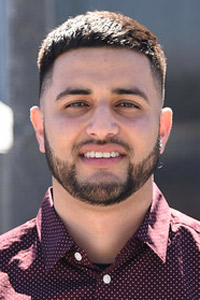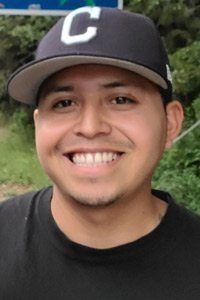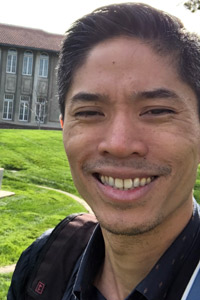Alejandro Zavala
Counseling Faculty
I grew up in a small town in Monterey County where most of the community is of Latinx
culture. It’s a town of immigrants and agricultural workers and both of my parents
worked in agriculture.
My parents preached about the importance of an education. They didn’t know what that
entailed and couldn’t support my siblings and I with the technical aspects of an education,
but they consistently told us they came to the United States for a better opportunity
and for their children to earn a college education. Even though I didn’t fully understand
what that meant, I felt a sense of obligation to earn a college degree.
I attended Hartnell College after high school because it’s the “thing to do” in America
and to try to fulfill my obligation. Once I got to college, I was placed in developmental
classes. This was a shock to me after having been in AP courses in high school. I
also didn’t take college very seriously. I only passed 4 of the 8 classes I took
in my first academic year. In my developmental English class, my instructor, who
was of Latinx descent, accused me of plagiarism. The assignment was to summarize
a writing piece, so I thought I was doing the assignment properly. She had me called
in front of the dean to discuss my case, without even speaking to me first. The dean
realized it was not intentional plagiarism, rather that I didn’t have the ability.
It was a shocking way to start my college journey.
While attending Hartnell, my sister graduated from UC Davis. She participated in
a Chicana/Chicano commencement ceremony. I saw how proud my parents were of her.
I was proud of her too. Attending my sister’s commencement ceremony let me know
that if she could graduate from college, so could I.
I only met with a counselor twice while I attended Hartnell. Once at the beginning
and once at the end to confirm I wasn’t going to lose my admission to the CSUs. I
decided to attend CSU Monterey Bay (CSUMB) for financial reasons. I felt imposter
syndrome when I first arrived. However, after a few months of experience and seeing
my exam scores and how I was performing, I realized I belonged at CSUMB.
At CSUMB I studied psychology and realized I wanted to work with people one-on-with
also having the option being an instructor. I was looking for a career where I could
teach and help individuals. I found community college counseling and realized I needed
a master’s degree. Prior to that I had only intended on earning a bachelor’s degree.
I began working with a program called Gear Up and my colleagues were attending the
Educational Counseling program at SJSU. They encouraged me to apply and it fit all
my career and academic needs. Through the program I networked and got an internship
at Gavilan College. After completing the internship, I was hired as a part-time counselor
at Gavilan. I worked there for one year and through my network again, I was referred
to a position at Mission College, and the rest is history.
Contrary to my work now, I wasn’t a very engaged student at any point in my educational
career. I did play a few sports in high school, but I didn’t attend any extracurricular
activities. At community college and CSUMB, I went to school, went to work, and then
went home. In retrospect, I wish I had attended more cultural activities and equity
themed events. I wish I had attended events for the Latinx community, and those that
helped me learn more about other cultures as well.
My advice to students – try to attend campus events,but attend those that speak to
your passions and interests. Also identify staff and faculty across campus that can
and want to help. Be bold enough to ask for the help you need. I can truly say,
in my life, when I’ve asked for help, people got excited and wanted to help. In those
instances where the person I asked couldn’t help, they referred me to someone that
could.
Furthermore, I wasn’t the type of student who got involved in class either. I wish
I had built stronger relationships with instructors I connected with. I didn’t realize
I would need letters of recommendation in the future. So, when I did need them, I
didn’t have any instructors to ask. I encourage you to make those connections – people
are willing to help.
Lastly, each of you is on your own individual journey. And with that, you have your
own individual challenges and may even doubt if going to college is worth the time,
energy, sacrifice, and balancing the other responsibilities you have (I know I did).
No one sees the sacrifice, but they will see the results. Even though the journey
gets hard, remember what you’re doing it for. You’re doing it for yourself. You’re
doing it for those that paved the way for you. When you attain your goal, it’s going
to be so fulfilling because of the sacrifice you made. Keep going, the sacrifice
is worth it.
Epigmenio Vasquez Vega
Student Records Advisor
I was born in Mexico and my family came to America when I was 6 years old and settled into the Central Valley to work in the agricultural fields. As the youngest family of six, I am the first of my brothers to earn a college degree and this has really driven me to continue pursuing higher education despite initial fears and the “imposter syndrome.” Do I really belong in a master’s program like Santa Clara University’s Educational Leadership program? I look around and I am the only Mexican student in my class. It turns out that your imagined fears can be more intimidating than actual reality. I am thriving in my current program after finishing up my first year.
My success with academic work stem from overcoming fears to ask for help. My loving family including my mom knew little about the education system. My mom made sure I was well fed but couldn’t fully understand where I was going with this “college stuff.” I recall having to commit to 3 days of working in the orange fields to continue helping family while attending college the other 3 days out of the week. It is the reality of our students and families that need to financially assist loved ones while trying to excel academically.
I graduated with a bachelor’s degree in Psychology from CSU Monterey Bay thanks to mentoring at that time from Mario Flores (current Mission College employee working for the HSI-STEM program) and learning slowly to recognize my self-worth and giving it my best. During my time in college, I took the opportunity to get hands-on experience by working with adults with developmental disabilities and children with autism. This led me to commit myself to being a change agent in the future to serve students.
The opportunity for a contract position with Mission to work in the Records and Financial Aid Office a year ago cemented my goal to be a leader at the community college system. I am now working full-time in the Admissions and Records office with a great team!
My advice to our students, especially those who are lacking support with financial concerns: Ask for help and just GO FOR IT. You’ll have doubts along the way but sometimes you just have to experience being in a classroom and a new and uncomfortable space and then you realize you can develop the skills and knowledge to contribute like everyone else in the room. Seek out that sincere person who wants to help you and you will find your way!
Hai Nguyen
History Faculty
My story both reflects and contradicts the typical immigrant experience. I came to America in 1993 with my sister and parents after my 2 older brothers fled communism in the 1980’s and resettled here in the states.
I grew up in Rowland Heights suburbs where we were only 2 Vietnamese families in the town. This felt lonely and isolating at first, but it also was a blessing because it forced me to pick up English more quickly and exposed me to diverse children of different backgrounds. Through these children’s families and watching a lot of Sesame Street, I learned more about American culture like holidays and celebrations.
Because I was the youngest in my family with a large age gap, I didn’t face the same pressures to pursue a set path. Of course, my father did choose to move to Silicon Valley when I was 15 thinking that I can land a tech job in the future. This uprooted my foundation and connections I had formed at the time. I struggled with mental health for our family wasn’t keen on sharing feelings, so I had to manage those challenges on my own. I was forced to move out of the family at 18 years old. Having to fend for yourself and be a true adult pushed me to mature and grow up quickly.
I will forever be grateful to the California community college system. Without De Anza College, I would not be where I am today thanks to the support services and mentorship that I received.
Initially, I chose world history to major in because I felt that American history was not relevant for people like myself due to the racial dichotomy of black or white. Rarely did I hear and learn about voices of immigrants or people of Asian ancestry. Things changed when I transferred to San Francisco State University where I met my mentor Dawn Mabalon (may she rest in power) who challenged that traditional narrative of American history. “Why can’t your family story be part of the American story?” She once asked me during our discussion of the Vietnam War and it forever inspired me to reframe the story of America to tell a more inclusive history that is relevant to all students.
Inspired to challenge and expand the master narrative, I switched my major to US history and earned my bachelor’s degree knowing I wanted to become a community college instructor. I moved on to complete a master’s degree from SFSU and began to teach as an associate faculty member throughout the Bay Area for almost the last decade.
I chose to dedicate my life to teaching American history because I want to expand the narrative of American history and most of all, be a model for students, especially our AAPI students, to overcome stereotypes and find their passion. BIPOC learn through emulation and sometimes students need to “see it to believe it” - in this case, seeing faculty that look like them teaching a subject/topic that they’re passionate about.
My advice to students: Go to every class with an open mind. Don’t fall into the stereotypes and major in something because others are doing it or you’re told to do so by others. Come with a blank slate and see what ideas and inspiration may resonate for you in every class. You’ll begin to see patterns and connect the dots to what you’re good at when you look back at your transcript and note down what you enjoyed and what you excel at.
A fun, random fact about myself is a friendly warning to my Mission College community: I don’t have an indoor voice! Wasn’t born with it but it comes in handy since my students cannot say they can’t hear me when we’re in class!
Success Stories Home • Page 1 • Page 2 • Page 3 • Page 4 • Page 5 • Page 6




